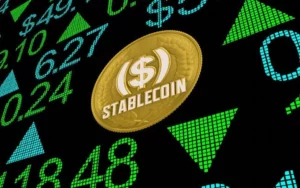The Bank for International Settlements (BIS), which helps central banks work together, has warned that stablecoins—digital coins tied to the US dollar—could hurt countries’ control over their own money.
The BIS says these coins are growing quickly and could cause problems if not properly managed. Stablecoins are a type of cryptocurrency that tries to keep the same value as a regular currency like the US dollar.
People use them to send money across borders, trade other cryptocurrencies, and make fast payments. Right now, almost all stablecoins are linked to the dollar, and the total value of these coins is more than $250 billion.
The two biggest stablecoins, Tether and Circle, hold over $200 billion in US government bonds. The BIS says stablecoins are not as safe as money from a central bank.
They can lose value if the company behind them has problems or if there is doubt about the money backing them. In 2022, one big stablecoin called TerraUSD collapsed, causing big losses for investors.

The BIS also worries that people in countries with weaker economies might move their money into stablecoins, making it harder for those countries to manage their own finances.
Another problem is that stablecoin companies are not always clear about where they keep the money that backs their coins. Some countries, like those in the European Union, have started making new rules to control stablecoins.
Tether, the largest stablecoin, left the EU market because of these new rules. The BIS says stablecoins do make some things easier. They let people send money cheaply and quickly, and they help businesses move money across borders.
For example, sending $200 with a stablecoin can cost less than a cent, while banks might charge much more. But the BIS believes there is a better way.
It wants central banks to create their own digital money using new technology. This would let people and businesses use digital money that is safe and controlled by the country’s central bank.
Some countries are already testing these ideas, hoping to make payments faster, cheaper, and safer. The BIS’s message is clear: stablecoins are growing fast, but they are not as reliable as traditional money.
Central banks should lead the way in making digital money that people can trust. This will help keep the financial system safe and make sure countries stay in control of their own money.
Source link
https://findsuperdeals.shop/


